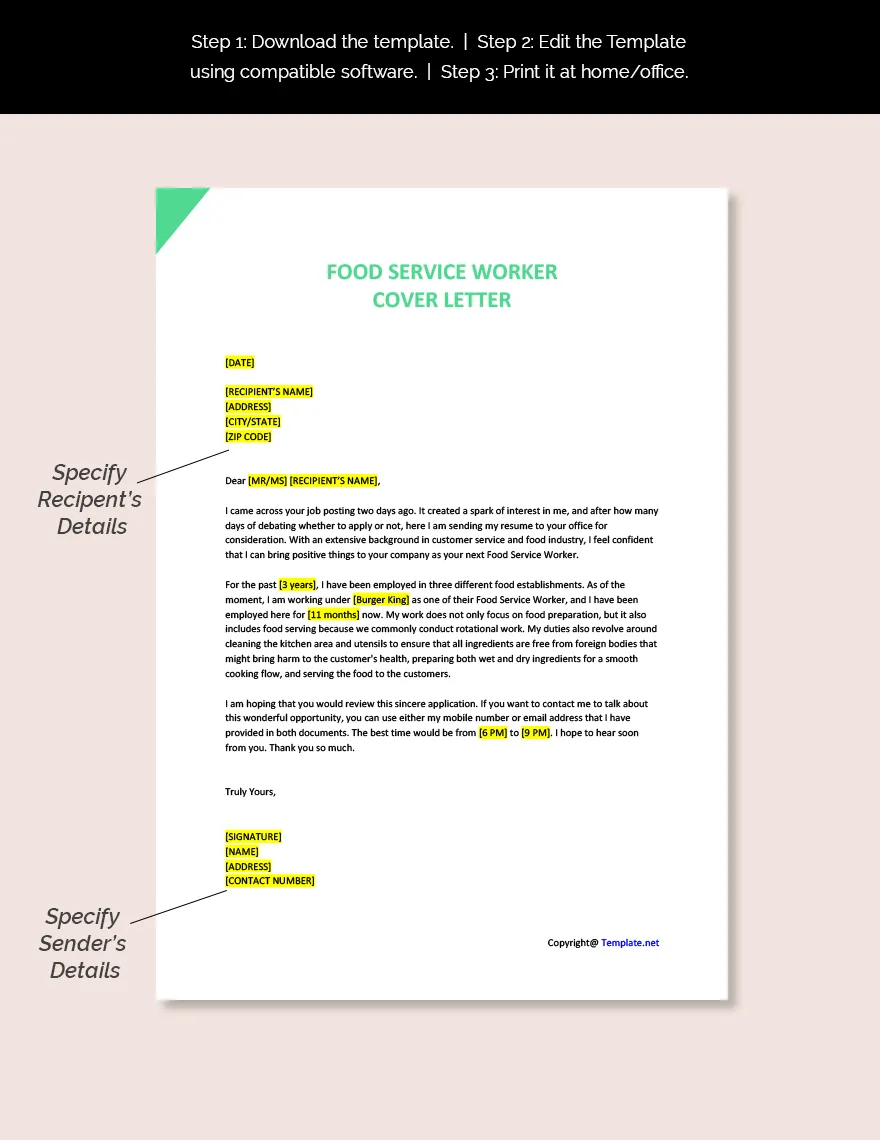Crafting a Winning Food Service Cover Letter
In the competitive world of food service, a well-crafted cover letter is your first opportunity to make a strong impression. It serves as your personal introduction, allowing you to showcase your skills, experience, and enthusiasm beyond what’s listed on your resume. This guide provides essential tips and strategies for writing a cover letter that grabs attention and increases your chances of landing a job in the food service industry. A compelling cover letter not only highlights your qualifications but also demonstrates your understanding of the specific role and the company’s values. Think of it as your chance to tell a story – your story – and to connect with the hiring manager on a personal level.
Understanding the Importance of a Cover Letter
A cover letter is more than just an optional document; it’s a vital tool in your job application arsenal. It provides context to your resume, explaining why you’re the perfect fit for the position. It allows you to elaborate on your skills, provide specific examples of your achievements, and express your personality. The cover letter also demonstrates your communication skills, attention to detail, and genuine interest in the opportunity. In many cases, a well-written cover letter can set you apart from other applicants, especially if your resume alone doesn’t fully capture your qualifications or the value you bring to the table. It’s your chance to shine and make a memorable first impression.
Highlighting Relevant Skills and Experience
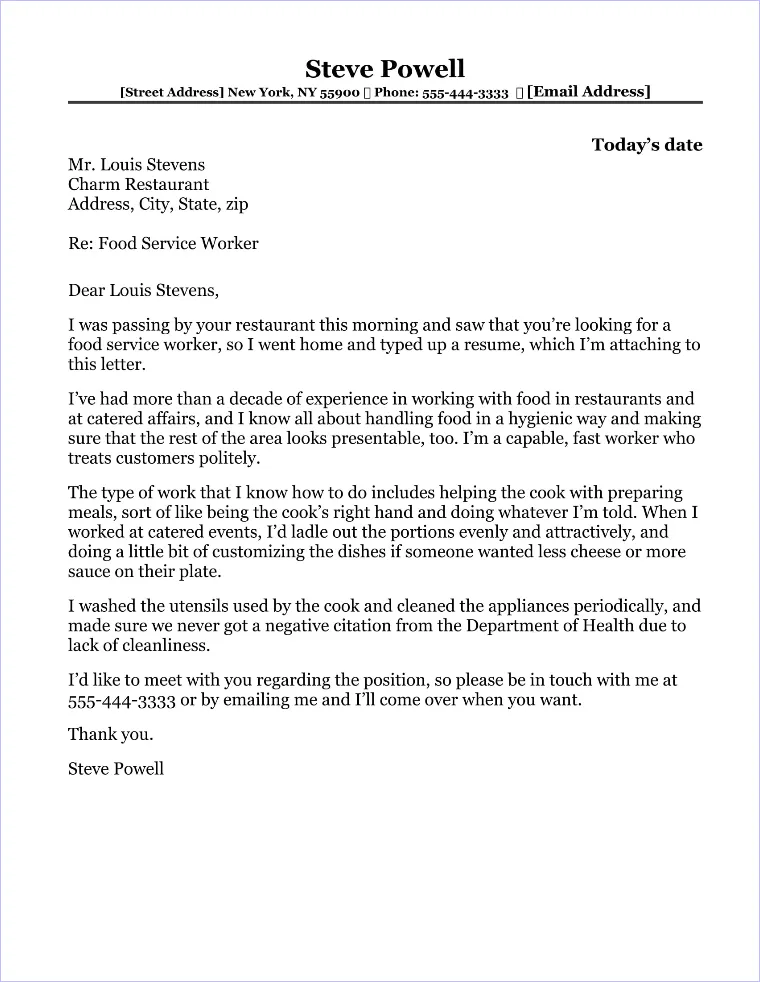
Your cover letter should prominently feature the skills and experiences that are most relevant to the food service role you’re applying for. This isn’t a summary of your resume; it’s an opportunity to delve deeper and provide context. Consider the specific requirements listed in the job description and tailor your letter to address them directly. Use keywords from the job posting to demonstrate that you’ve carefully read and understand the requirements. Focus on how your skills and experience align with the needs of the employer, and provide concrete examples of your past accomplishments. This approach shows the hiring manager that you’re not just a candidate, but a solution.
Key Skills for Food Service Roles
Food service positions require a variety of skills, both hard and soft. Highlight skills such as customer service, communication, teamwork, time management, and the ability to work under pressure. If you’re applying for a kitchen role, emphasize your cooking skills, knowledge of food safety, and ability to follow recipes. For front-of-house positions, highlight your ability to interact with customers, handle complaints, and manage reservations. Mention your proficiency in using point-of-sale (POS) systems and any relevant certifications, such as food handler certifications or alcohol server permits. Remember to provide evidence of these skills through specific examples from your previous experiences.
Showcasing Previous Food Service Experience
Your cover letter is the perfect place to elaborate on your past food service experience. Don’t just list your job titles and responsibilities; provide specific examples of your accomplishments and how you contributed to the success of your previous employers. Use the STAR method (Situation, Task, Action, Result) to structure your examples. For instance, describe a situation where you resolved a customer complaint (Situation), the task you were assigned (Task), the actions you took to resolve it (Action), and the positive outcome (Result). Quantify your achievements whenever possible – for example, “Increased customer satisfaction scores by 15%” or “Reduced food waste by 10%.”
Tailoring Your Cover Letter

One of the biggest mistakes job seekers make is sending out generic cover letters. To truly impress a hiring manager, you need to tailor your cover letter to each specific job you apply for. This means taking the time to research the employer, understand the role, and customize your letter to address the specific needs and requirements of the position. A tailored cover letter demonstrates your genuine interest in the opportunity and shows that you’ve put in the effort to understand the company and the role.
Researching the Employer
Before you start writing your cover letter, do some research on the employer. Visit their website, read their “About Us” section, and check out their social media profiles. Understand their mission, values, and culture. What kind of food do they serve? What is their reputation in the community? Knowing this information will help you tailor your letter to their specific needs and demonstrate that you’re genuinely interested in working for them. This research will also give you insights into the company’s values and allow you to align your qualifications with their goals. You can also check online reviews and news articles to gain a broader understanding of the company’s operations.
Customizing Your Letter for the Job
Once you’ve researched the employer, review the job description carefully. Identify the key requirements and responsibilities. Then, use this information to customize your cover letter. Highlight the skills and experiences that are most relevant to the position. Use keywords from the job description and provide specific examples of how you’ve demonstrated those skills in the past. Explain why you’re a good fit for the role and how you can contribute to the company’s success. This level of personalization shows that you understand the job and are genuinely interested in the opportunity.
Structuring Your Cover Letter for Maximum Impact
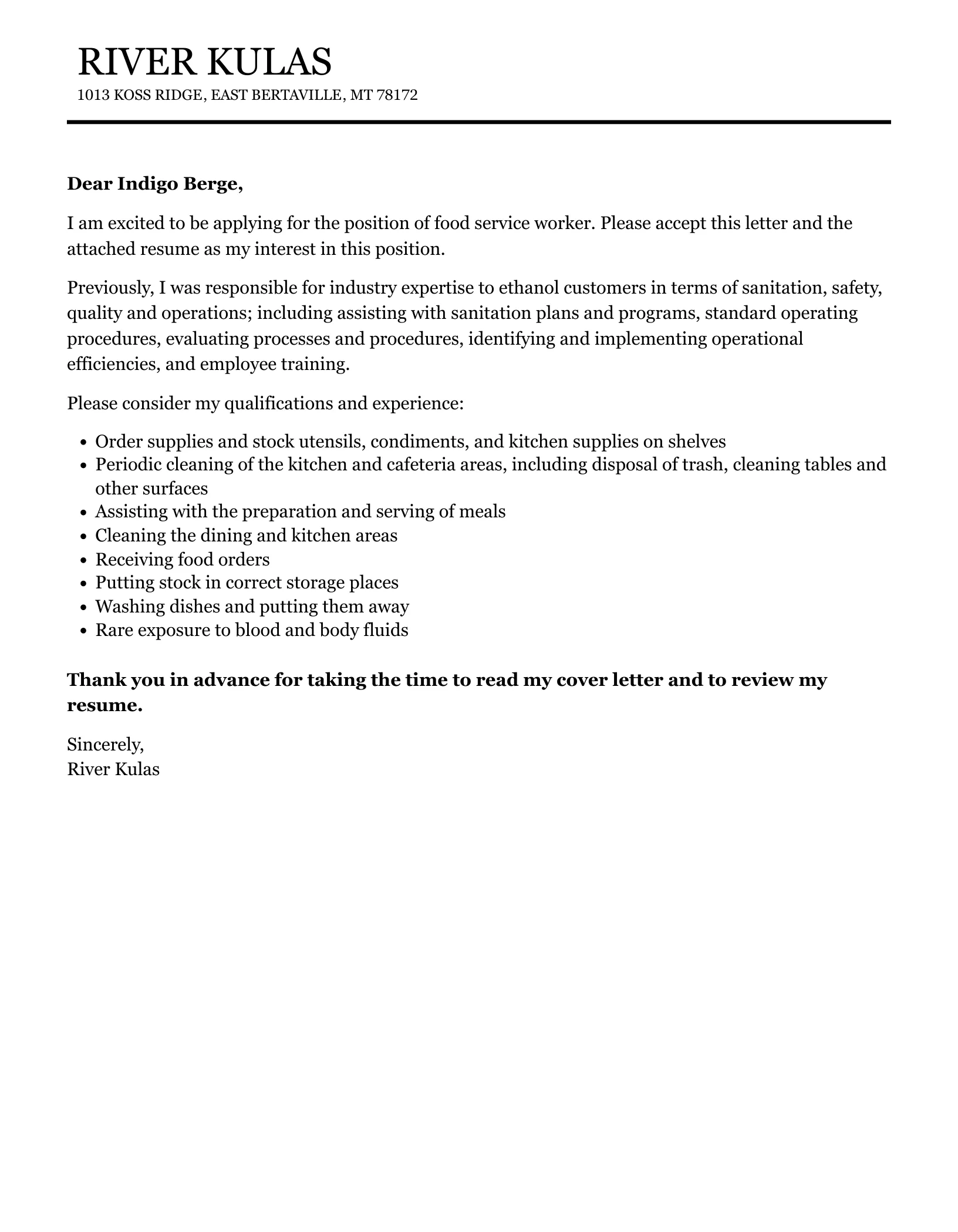
A well-structured cover letter is easy to read and makes a strong impression. Follow a standard format with a clear introduction, body, and conclusion. Use clear and concise language, and break up your text with paragraphs to improve readability. Aim for a professional tone and avoid overly casual language. Your cover letter should complement your resume, not duplicate it. Instead, use the cover letter to expand on key points and provide context. A well-organized cover letter is a reflection of your communication skills and attention to detail.
The Introduction Attract Attention
The introduction is your opportunity to grab the hiring manager’s attention and make a positive first impression. Start with a strong opening statement that clearly states the position you’re applying for and where you saw the job posting. You can also mention something that caught your attention about the company or the role. Briefly highlight your key skills and experience to show why you’re a good fit. Make your introduction concise and engaging to encourage the reader to continue reading. Your introduction is the hook; make it compelling.
The Body Highlighting Your Value
The body of your cover letter is where you showcase your skills, experience, and accomplishments. Use this section to elaborate on the information in your resume and provide specific examples of your achievements. Address the key requirements listed in the job description and explain how your qualifications align with their needs. Quantify your achievements whenever possible to demonstrate your impact. Focus on the value you can bring to the company and why you’re the ideal candidate. This is your chance to sell yourself and show the hiring manager why they should choose you. Use action verbs and provide context to your past accomplishments, relating them back to the needs of the company.
The Conclusion Call to Action
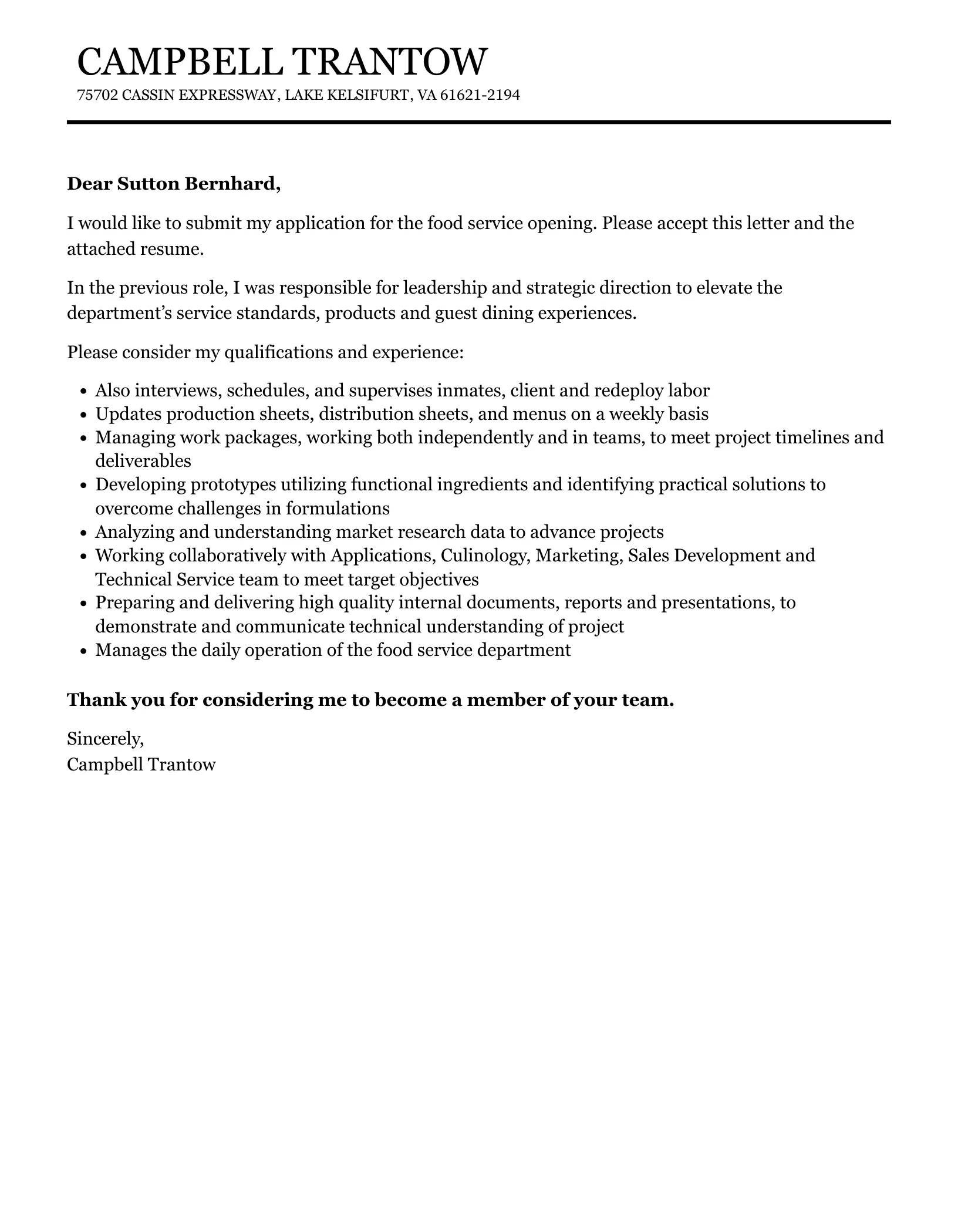
The conclusion is your opportunity to reiterate your interest in the position and encourage the hiring manager to contact you. Thank them for their time and consideration. Express your enthusiasm for the opportunity and state your desire to learn more about the role. Include a clear call to action, such as “I am eager to discuss my qualifications further in an interview” or “I look forward to hearing from you soon.” End with a professional closing, such as “Sincerely” or “Best regards,” followed by your name. Make sure the conclusion is concise and leaves a lasting positive impression. Ensure that your contact information is readily available so the hiring manager can easily get in touch.
Essential Sections to Include
Certain sections are essential in a food service cover letter. These sections provide the necessary information to the hiring manager and make your application complete. Missing any of these sections can make your application look incomplete or unprofessional. Ensuring that all of the below sections are correct and well-written is paramount to showcasing your interest and qualifications.
Contact Information
Include your full name, address, phone number, and email address at the top of your cover letter. Make sure your contact information is accurate and up-to-date. Use a professional-sounding email address. Consider the company’s preferred method of communication and include that on the contact information as well. This information allows the hiring manager to quickly and easily contact you to schedule an interview or request additional information. Double-check all the details to avoid any errors.
Professional Salutation
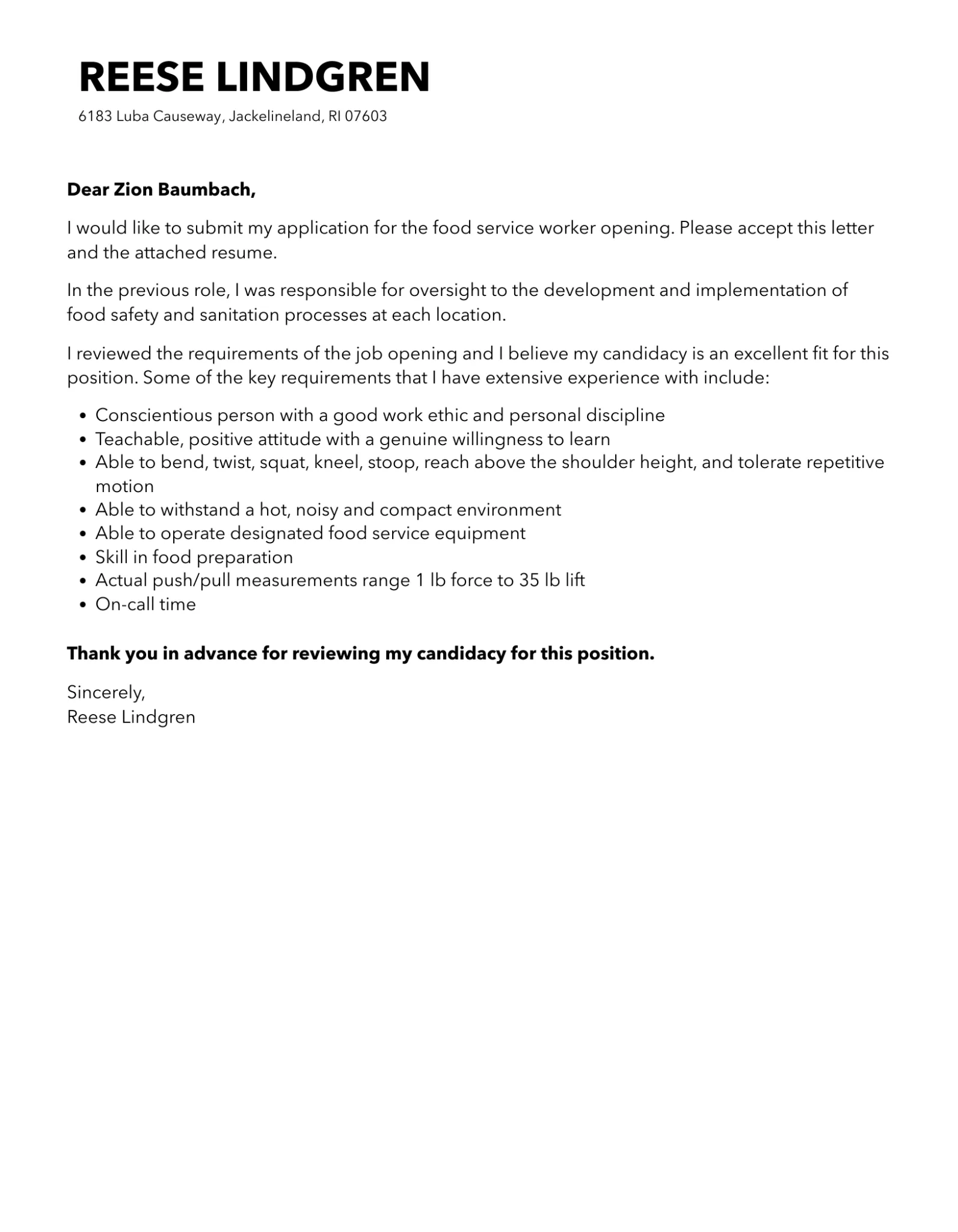
Address the hiring manager by name if possible. If you can’t find the hiring manager’s name, use a general salutation such as “Dear Hiring Manager” or “Dear [Restaurant Name] Team.” Avoid overly casual greetings like “Hi” or “Hello.” Researching the hiring manager’s name demonstrates that you’ve put in the effort to tailor your application. Addressing your letter to a specific person is more personal and shows a genuine interest. If the hiring manager’s name is unknown, make sure to research who to address your letter to within the company.
Body Paragraphs Detailing Experience
This is the most important part of your cover letter. Use the body paragraphs to showcase your skills, experience, and accomplishments. Provide specific examples to demonstrate your value. Focus on the requirements listed in the job description and explain how your qualifications align with their needs. Quantify your achievements whenever possible. Use the STAR method to structure your examples, and tailor each paragraph to the specific job. Remember, the goal is to convince the hiring manager that you are the best candidate for the role and that you have what it takes to contribute to the company’s success.
Compelling Closing Statements
Your closing statement should reiterate your interest in the position and encourage the hiring manager to contact you. Thank them for their time and consideration. Express your enthusiasm for the opportunity and state your desire to learn more about the role. End with a clear call to action and a professional closing. This is your final chance to leave a positive impression. Ensure that your closing is concise, enthusiastic, and encourages the hiring manager to take the next step in the hiring process. End with a professional closing, such as “Sincerely” or “Best regards,” followed by your name.
Formatting and Presentation
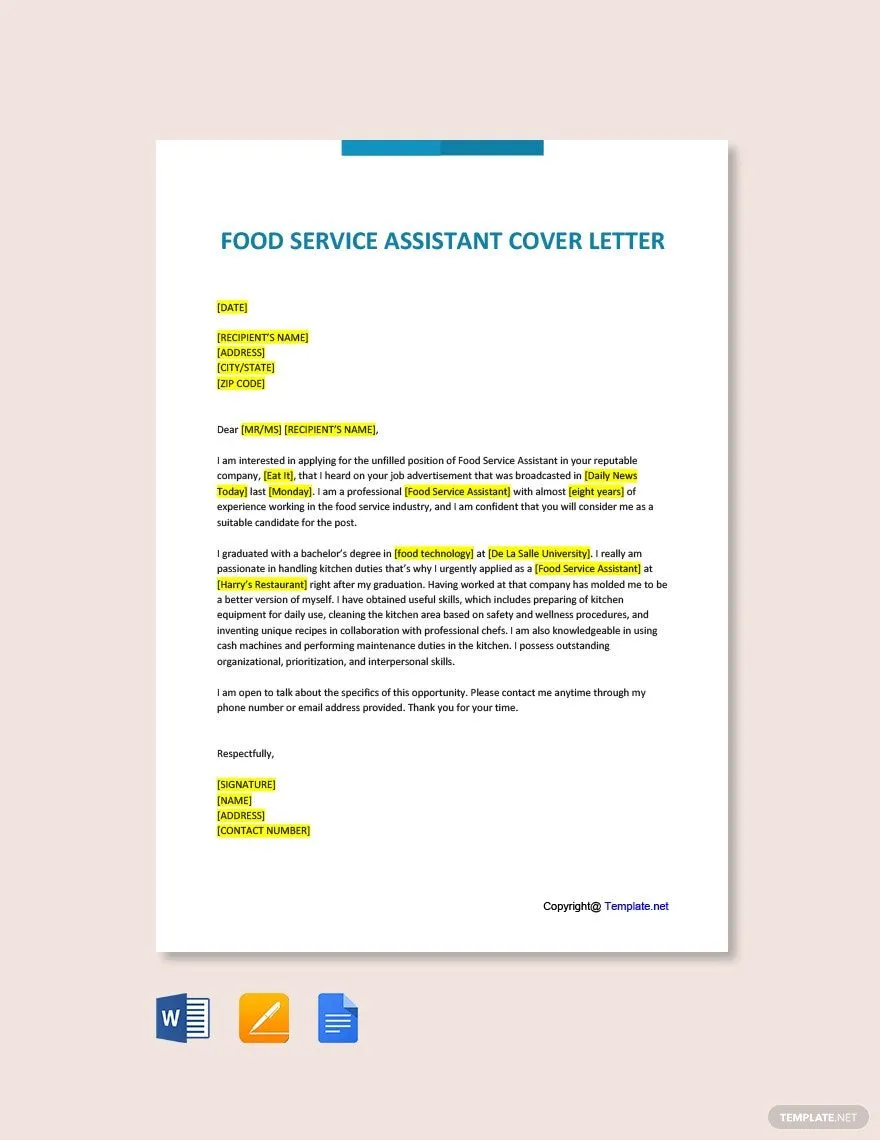
The formatting and presentation of your cover letter are just as important as the content. A well-formatted cover letter is easy to read and makes a professional impression. Use a clear and consistent font, maintain a professional tone, and proofread your letter carefully for any errors. A visually appealing cover letter shows your attention to detail and your commitment to presenting yourself in the best possible light. A poorly formatted cover letter, full of errors, can send the wrong message to the hiring manager.
Font and Readability
Choose a professional and easy-to-read font, such as Times New Roman, Arial, or Calibri. Use a font size between 10 and 12 points. Use clear and concise language and break up your text with paragraphs to improve readability. Avoid using overly ornate fonts or excessive formatting. Keep your cover letter to one page if possible. Make sure the text is well-spaced, with margins of at least one inch on all sides. This will make your cover letter visually appealing and easy for the hiring manager to read. Ensure that you have enough white space for readability.
Proofreading and Editing
Proofread your cover letter carefully for any typos, grammatical errors, and spelling mistakes. Errors can make you look unprofessional and may lead to your application being rejected. Use a grammar checker and ask a friend or family member to review your letter. Ensure that the content is clear, concise, and free of any errors. Double-check your contact information to avoid mistakes. Proofreading is a crucial step in the job application process. A polished and error-free cover letter demonstrates that you pay attention to detail and are committed to excellence.
Avoiding Common Mistakes
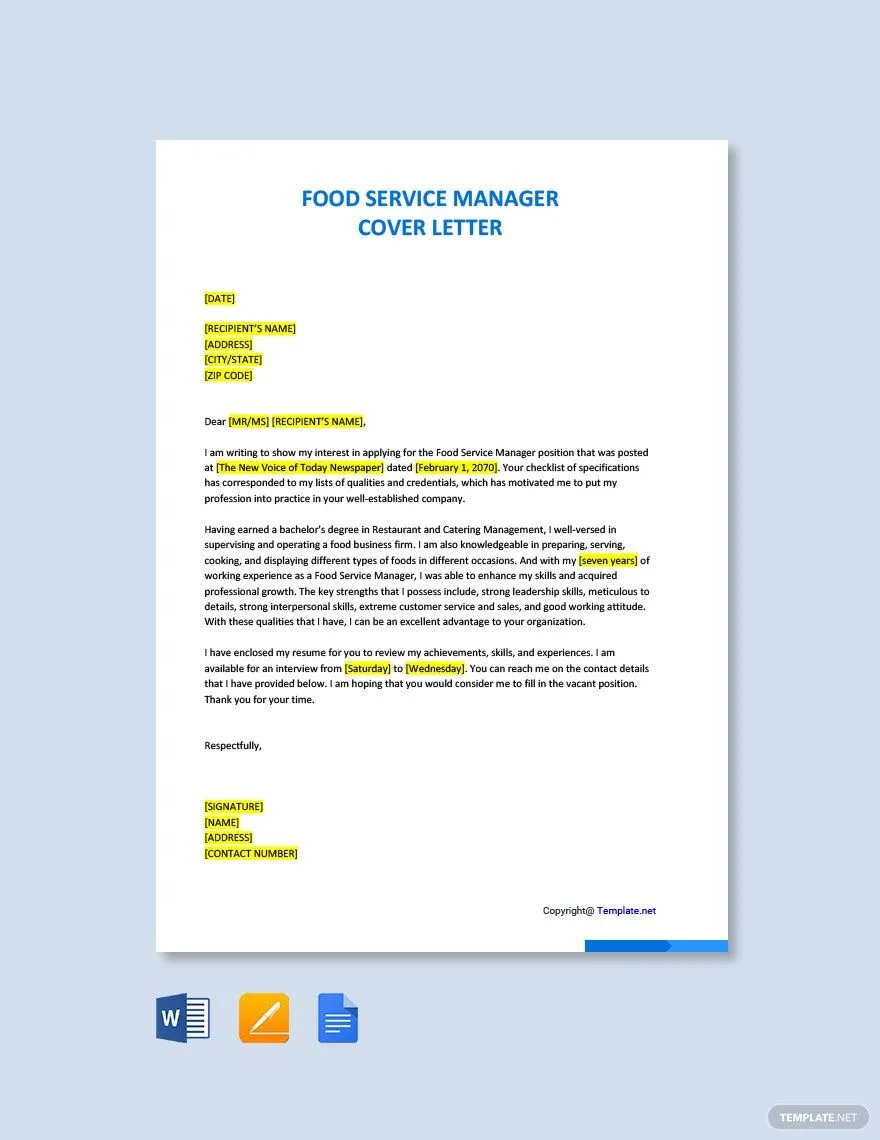
Certain mistakes can significantly reduce your chances of landing a job in the food service industry. Avoiding these common errors will help you create a more effective cover letter that stands out. Being mindful of common pitfalls can save you valuable time and increase your chances of getting hired. Addressing these common issues can help the hiring manager see the best version of you.
Generic Cover Letters
Avoid sending out generic cover letters that are not tailored to the specific job or company. Customize your cover letter for each application. Research the employer and the role, and highlight the skills and experiences that are most relevant. Demonstrating that you have taken the time to understand the company and the role shows your genuine interest and commitment. Personalizing your cover letter significantly increases your chances of getting noticed and increases your chances of getting an interview.
Typos and Grammatical Errors
Typos and grammatical errors can undermine your professionalism and make a negative impression. Proofread your cover letter carefully and use a grammar checker. Ask a friend or family member to review your letter. An error-free cover letter demonstrates your attention to detail and commitment to excellence. Always review your work and have a second set of eyes look it over. This is a crucial step in ensuring the quality of your cover letter.
Focusing on Yourself Too Much
While it’s important to highlight your skills and experience, avoid focusing solely on yourself. Instead, focus on how you can contribute to the company’s success. Explain why you are a good fit for the role and what value you can bring to the team. Frame your achievements in terms of their impact on your previous employers. Show the hiring manager what you can do for them, not just what you’ve done in the past. Tailor your letter towards the needs of the specific job you are applying for.
Examples of Effective Cover Letter Phrases
Using the right phrases can make your cover letter more compelling and memorable. Here are some examples of phrases to use: “I am eager to contribute my skills in…”, “My experience in… aligns perfectly with the requirements of this role.”, “I am a highly motivated and results-oriented individual.”, “I am confident that I can make a significant contribution to your team.”, “I am proficient in…” Consider including these phrases in your cover letter to showcase your ability to take charge and achieve success. Using strong phrases that highlight your enthusiasm will make a positive impression on the hiring manager.
Showcasing Enthusiasm and Passion
Expressing your enthusiasm and passion for the food service industry can make your cover letter more compelling. Show that you’re excited about the opportunity and genuinely interested in working for the company. Mention something that resonates with you about the company or the role. Let your personality shine through. Highlight any awards, recognitions, or positive customer feedback you’ve received to demonstrate your dedication and commitment to excellence. Use phrases like, “I am passionate about providing exceptional customer service” or “I am thrilled to be applying for…”
Quantifying Achievements
Whenever possible, quantify your achievements. This adds credibility and demonstrates the impact you’ve had in previous roles. Use numbers to illustrate your successes. For example, “Increased customer satisfaction scores by 15%” or “Reduced food waste by 10%.” Quantifying your achievements is a great way to show hiring managers that you are results-oriented. Use metrics that demonstrate your impact and demonstrate your ability to excel in a food service role. Make sure to quantify when you are describing past accomplishments to highlight your value.
Using Action Verbs
Use strong action verbs to make your cover letter more dynamic and engaging. Start each bullet point with an action verb, such as “managed,” “led,” “implemented,” or “achieved.” Action verbs demonstrate your initiative and help to create a more compelling narrative. By utilizing action verbs, you can make your accomplishments more visible and impactful to the hiring manager. Here are a few examples of strong action verbs to use: “Managed,” “Trained,” “Coordinated,” “Supervised,” and “Implemented.”
Cover Letter Templates and Resources
There are many online resources that can help you write a winning cover letter. Use templates and examples to get started, but be sure to tailor the content to your specific needs. Consider using a resume writer to get professional guidance. Finding and utilizing resources to support your cover letter is crucial to success. Take advantage of these resources to create the best cover letter possible.
Online Templates
There are many free and paid cover letter templates available online. These templates can provide a framework for your letter and help you get started. However, be sure to customize the template to fit your specific needs and the requirements of the job. Start with a template to provide a basic structure and then customize it with your skills, experience, and personality. Avoid using a template that is too generic. Look for templates that can be customized to match the style of the company you are applying to. Templates help streamline the writing process.
Professional Resume Writers
If you’re struggling to write a cover letter that stands out, consider hiring a professional resume writer. A resume writer can help you create a compelling cover letter that highlights your skills and experience and helps you get noticed by employers. These professionals have expertise in crafting effective cover letters and resumes. This service can prove invaluable in securing your dream job. A professional can offer an objective view and help you present your strengths in the best possible way. They can also ensure your cover letter and resume follow current industry standards.
